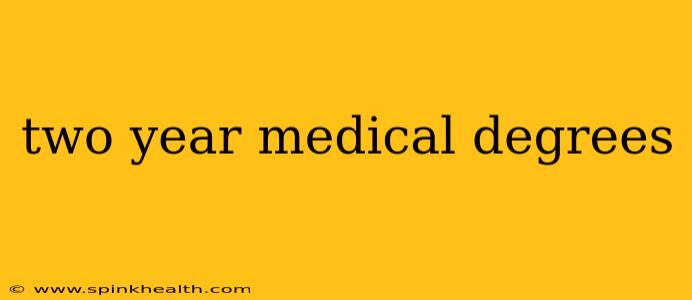Two-Year Medical Degrees: A Journey to Becoming a Physician
The dream of becoming a doctor often conjures images of long years of grueling study. While the traditional medical school pathway is lengthy, the landscape of medical education is evolving, offering alternative routes that can shorten the overall timeline. This article delves into the world of accelerated medical programs, specifically exploring two-year medical degrees and the realities behind this condensed pathway to a medical career.
It's important to preface this by clarifying that a true two-year medical degree leading to the practice of medicine in the U.S. or other major Western countries, does not exist. The rigorous training required to become a competent and safe physician necessitates a significant investment of time and experience. Programs claiming to offer this are often misleading and may not lead to licensure. However, there are accelerated pathways and programs that can significantly reduce the total time to becoming a practicing physician.
Let's explore some options and address common questions:
What are accelerated medical programs?
Accelerated medical programs aim to shorten the traditional medical school timeline. While not truly "two-year" degrees in the sense of replacing the entire curriculum, they may involve:
- Integrated programs: These combine undergraduate and medical school coursework, allowing students to complete both degrees in a shorter time than the traditional separate approach. For example, a combined bachelor's and medical degree program might take six years instead of the usual seven or eight.
- Post-baccalaureate programs: These programs are specifically designed for students who already have a bachelor's degree. They allow for a faster entry into medical school and, consequently, a quicker path to practicing medicine.
- Early assurance programs: Some universities offer early assurance programs, guaranteeing admission to their medical school upon successful completion of a specific undergraduate program. This eliminates the need for the highly competitive Medical College Admission Test (MCAT) and the application process itself, streamlining the process.
Are there any medical degrees that are shorter than the traditional four years?
No, there are no accredited medical degrees shorter than four years that allow for independent practice in the U.S. or comparable countries with rigorous licensing standards. The four-year structure is deeply ingrained in the medical curriculum to ensure students acquire the comprehensive knowledge and practical skills needed to treat patients safely and effectively. Any shorter program would likely lack the necessary depth and breadth of education.
What are the pros and cons of accelerated medical programs?
Pros:
- Reduced overall time to practice: The most significant advantage is the reduced time spent in education before starting your medical career. This could translate into years saved and earlier earning potential.
- Potentially lower overall cost: While tuition costs remain high, the reduced time in school can translate into lower overall educational expenses.
- Faster entry into the workforce: The ability to begin your medical career earlier can be appealing, especially for students eager to apply their knowledge and skills.
Cons:
- Intense academic pressure: Accelerated programs necessitate a fast-paced learning environment and require exceptional self-discipline and time management skills.
- High level of commitment: Success in these programs demands a significant commitment to academics and potentially less time for extracurricular activities or personal life.
- Limited program availability: These accelerated programs aren't widely available, making acceptance highly competitive.
Can I become a doctor in two years?
No, you cannot become a fully licensed, practicing physician in two years. The extensive training, clinical experience, and rigorous examinations required for medical licensure simply cannot be condensed into such a short timeframe. While accelerated programs can shave off some time, they don't fundamentally alter the substantial commitment necessary for a medical career.
In conclusion, while a two-year medical degree is unrealistic and potentially misleading, various accelerated pathways can help aspiring physicians shorten their overall journey to practice medicine. These programs require immense dedication and resilience, but for motivated and well-prepared individuals, they can offer a more efficient route towards a rewarding medical career. Remember to always research and thoroughly vet any program to ensure accreditation and legitimacy before committing.

